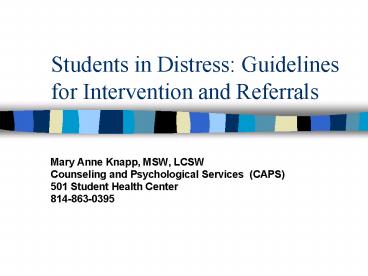Students in Distress: Guidelines for Intervention and Referrals - PowerPoint PPT Presentation
Title:
Students in Distress: Guidelines for Intervention and Referrals
Description:
Counseling and Psychological Services (CAPS) 501 Student Health Center. 814-863-0395 ... The Center for Counseling and Psych Services (CAPS) Tips for Recognition ... – PowerPoint PPT presentation
Number of Views:86
Avg rating:3.0/5.0
Title: Students in Distress: Guidelines for Intervention and Referrals
1
Students in Distress Guidelines for
Intervention and Referrals
- Mary Anne Knapp, MSW, LCSW
- Counseling and Psychological Services (CAPS)
- 501 Student Health Center
- 814-863-0395
2
Students in Distress Guidelines for Faculty
Staff Interventions
- The Importance of Your Role w/ Students
- College Student Issues/Distress
- The Center for Counseling and Psych Services
(CAPS) - Tips for Recognition
- Guidelines for Intervention/Referral
- Dealing with Specific Situations
- Evaluation and Ending
3
Young Adult/College Context
- Pressures for Academic Performance
- Overwhelming Life Changes
- Financial Issues
- Limited Social Support Network
- Losses/Traumas
- Identity Issues
- Lifestyle/Body Abuse
- Limits of Current Coping Skills/Strategies
- Development of Disorders in Adulthood
4
Penn State Counseling Contactsat University Park
CAPS
- 2500 students per year for clinical assessment
and treatment - Up to 16,000 clinical contacts per year
- 5000 outreach contacts with students including
programs postventions following crises/deaths
on campus
5
Center for Counseling and Psychological Services
(CAPS)
- Office 501 Student Health Center
- Hours Mon-Fri 8 am.-5pm.
- Phone 863-0395
6
Center for Counseling and Psychological Services
(CAPS)
- Initial Interview-Appt. and Crisis
- Individual Short Term Counseling
- Couples Short Term Counseling
- Group Therapy- 25 groups/semester
- Psychiatric Services (Medication Evals)
- Outreach Services-Workshops
- Consultation
- Referrals
7
CAPS GROUPS
- General Interpersonal Therapy Groups
- Womens and Mens Therapy
- Depression Group
- Stress Management Group
- Anxiety Group
- ADHD Support group
- Recovery Groups
- Discussion/Support Groups
8
Recovery Groups
- Substance Abuse
- Eating Disorders
- Sexual Assault
- Grief and Loss
9
Discussion/Support Groups
- LGBT Graduate Therapy Group
- Students of Color Support Group
- International Student Group
- Blended Heritage Discussion Group
- Dialogues About Race Groups
10
Center for Counseling and Psychological Services
(CAPS)
- Initial Interview- Appts. Crisis
- Individual Short-term Counseling
- Group Therapy
- Psychiatric Services
- Outreach Services-Workshops
- Consultation
- Referrals - Campus and Private
11
CRISIS RESOURCES
- CENTER FOR COUNSELING AND PSYCHOLOGICAL SERVICES
(CAPS) Mon- Fri 8 am - 5 pm - CENTRE COUNTY CAN HELP LINE 24 hr. 1-800-643-5432
- 911- For emergency Police/Ambulance
- 863-1111 Police Services on Campus
- 863-0342 Judicial Affairs
12
TIPS for Recognizing Distressed Students
- Use your senses to pick up observable cues.
13
Areas of Observation
- Difficulty with Academic /or Social Functioning
- Unusual Behaviors and Appearance
- References to Stressful Life Events
- References to Suicide, Homicide or Death
14
Difficulties with Academic Social Functioning
- Absences
- Withdrawal
- Excessive anxiety re performance
- Disruptive behavior
15
Unusual Behavior or Appearance
- Depressed mood or functioning
- Hyperactivity or pressured speech
- Deterioration in hygiene or self care
- Dramatic weight loss or gain
- Strange or bizarre behavior/Loss of contact with
reality - Problems with boundaries expectations
- Observable Signs of injury
16
References to Stressful Life Events
- Experiencing death of a significant other
- Experiencing a sexual or physical assault
- Experiencing discrimination/alienation
- Experiencing legal difficulties
- Any problem or situation viewed as a loss
17
References to Suicide, Homicide or Death
- Overwhelming hopelessness helplessness
- References to suicide or self harm
- References to homicide or assaultive behaviors
- Isolation/withdrawal
18
General Intervention Guidelines
19
Basic Helping Skills
- Structuring the Contact
- Passive Listening and Attending
- Active Listening-Reflections and Clarifying
Questions - Expressions of Support, Feedback and Validation-
I messages, Sharing Information - Defining Limits and Making Referrals
20
General Intervention Guidelines
- Arrange for a private place and a time when you
wont be interrupted - If you initiate the contact, express concerns in
a behavioral and non-judgmental way. - Let the student talk.
- Listen for both content and feelings.
21
Intervention (continued)
- Give Realistic Hope. Help student know their
options and resources and assure them that things
can get better. - Avoid a judging, distant or critical style
- Maintain clear and consistent boundaries and
expectations - Suggest and Normalize referral
22
Intervention (continued)
- Be sensitive to timing-Is this a crisis?
- Escalate and Facilitate as needed
- Prepare the student for what to expect
- Arrange a time to follow-up
- Consult when in doubt about an intervention
23
Dealing with Specific Situations
24
Suicide
- If someone alludes to suicide or you arent sure,
Its important to follow-up and ask. Has this
reached a point where you feel so badly you have
thought of suicide? - If suicidal, Refer for Help and Escalate as
needed Voluntary through CAPS or CAN HELP (24 hr
crisis) or Involuntary through Judicial Affairs
or Police Services.
25
Danger to Others
- If someone is making vague threats, its
important to follow up and ask if they are
serious. - Refer and Escalate as needed.
- Voluntary intervention through Police
intervention depending on the extent and immediacy
26
CRISIS RESOURCES
- CENTER FOR COUNSELING AND PSYCHOLOGICAL SERVICES
(CAPS) Mon- Fri 8 am - 5 pm - CENTRE COUNTY CAN HELP LINE 24 hr. 1-800-643-5432
- 911- Emer.-Police/Ambulance
- Judicial Affairs 863-0342
- 863-1111 Police Services on Campus
27
The End
- View Students in Distress workshop on the web
- http//www.sa.psu.edu/caps/distress/































